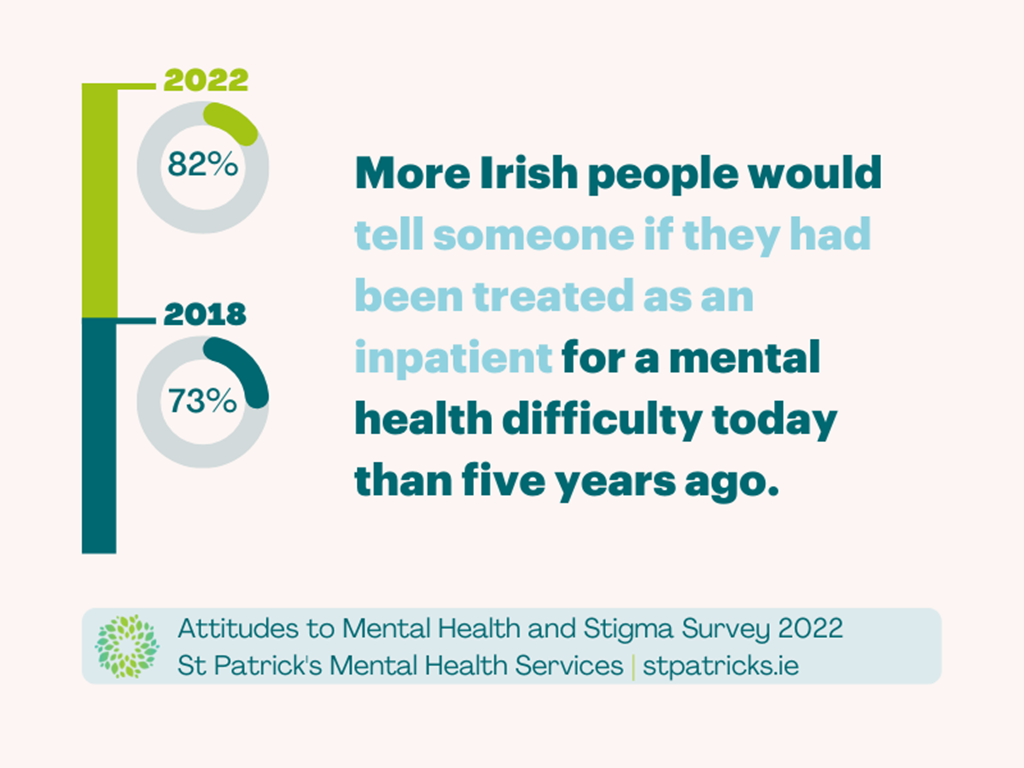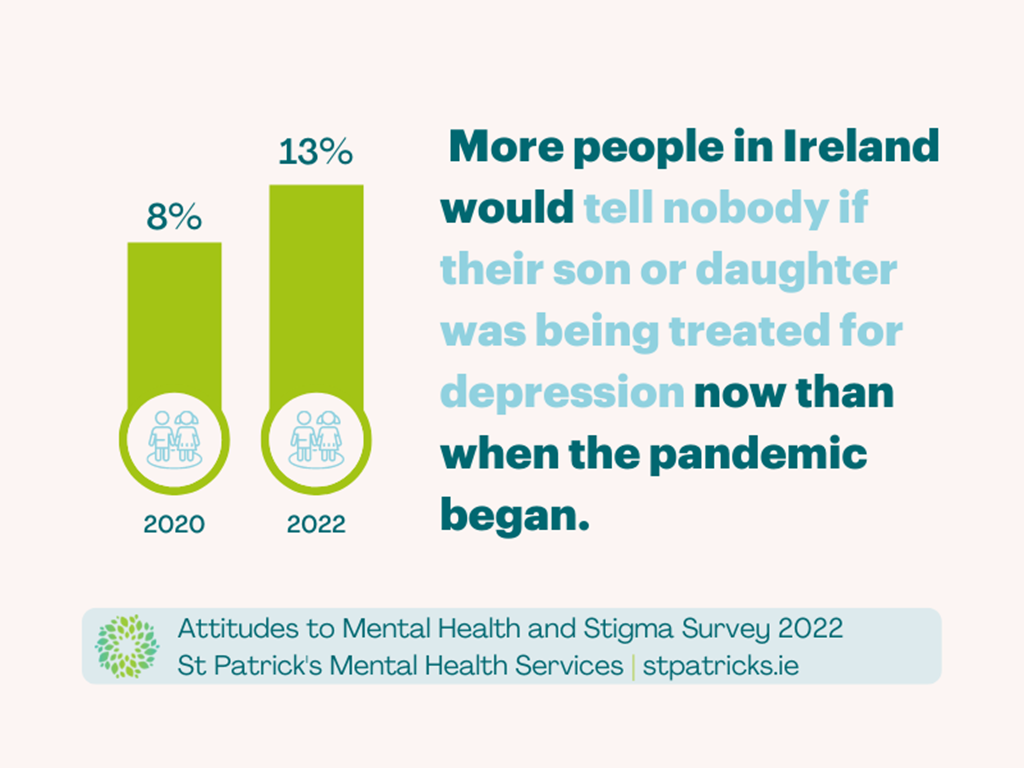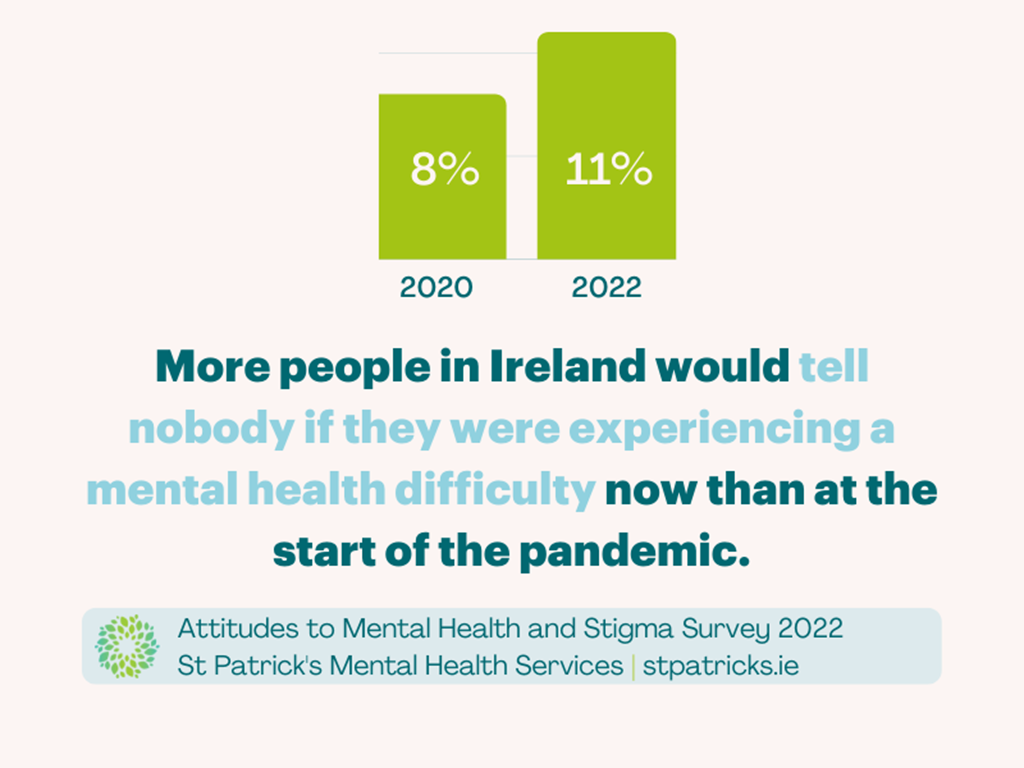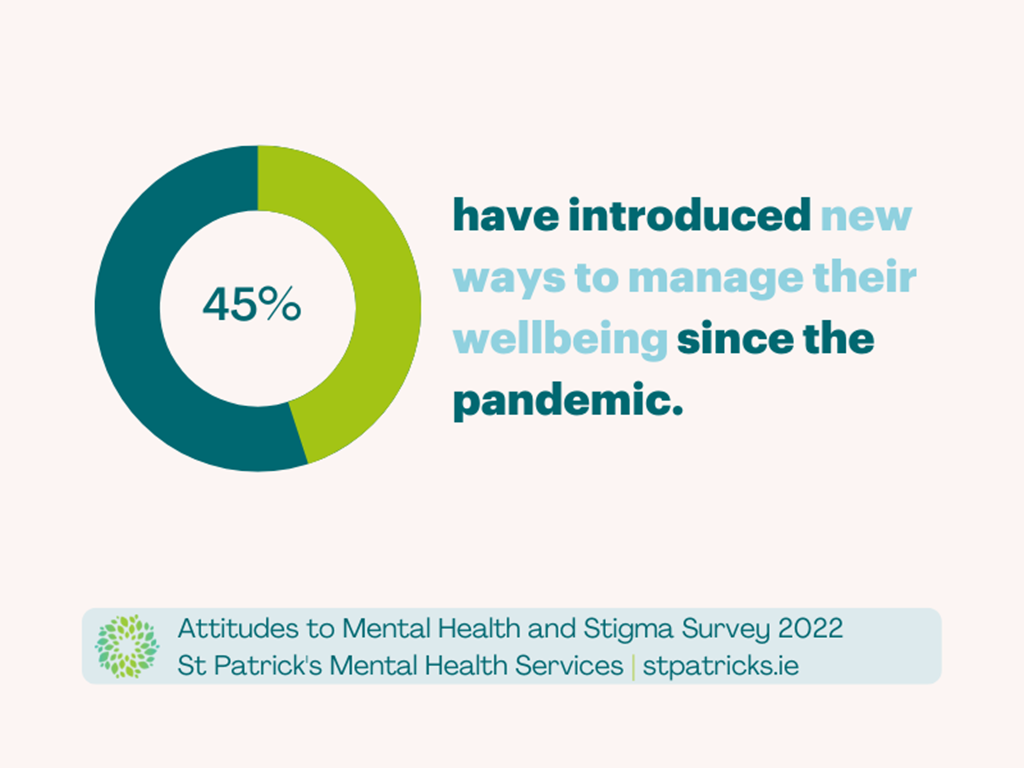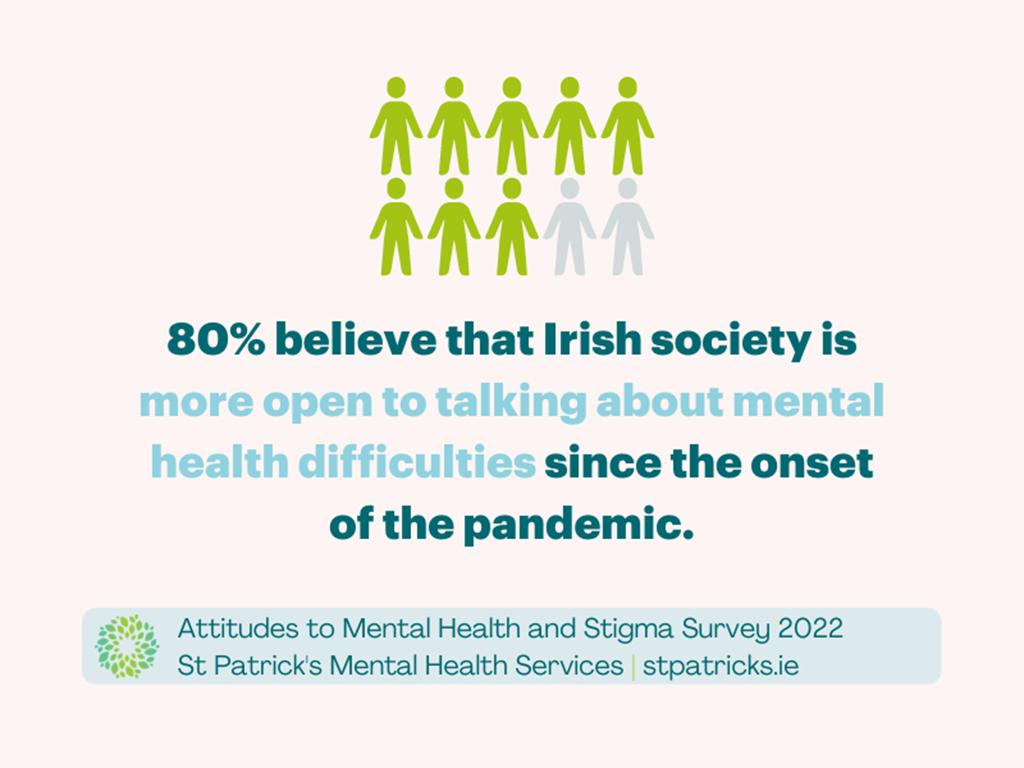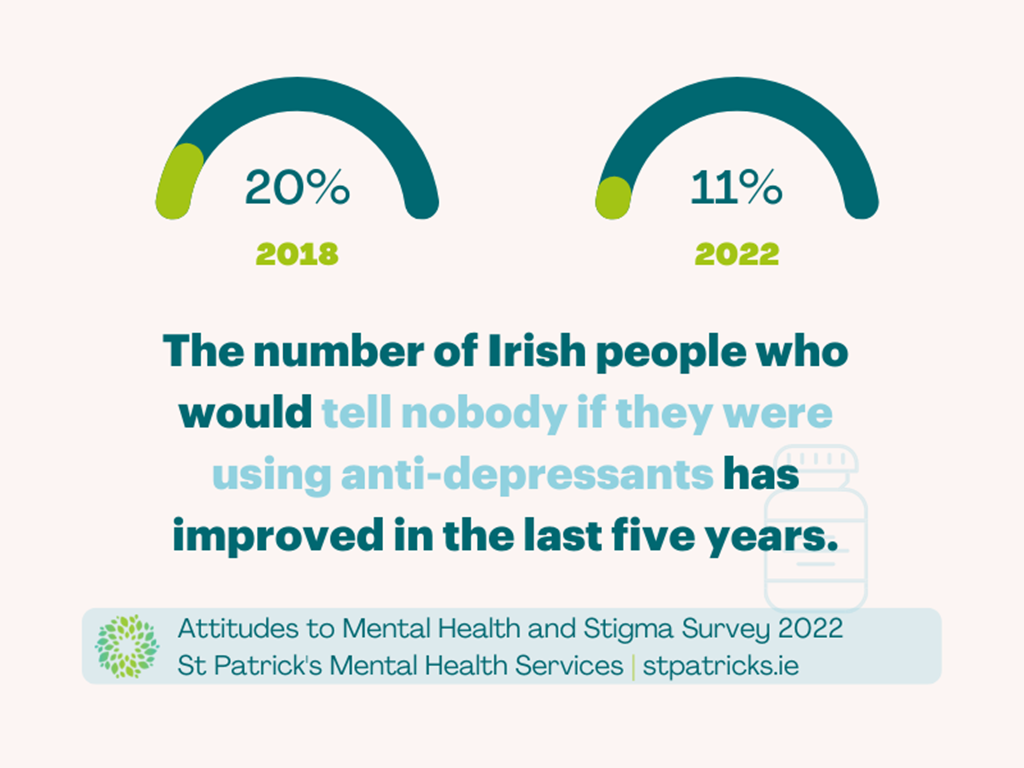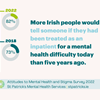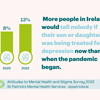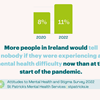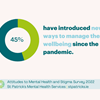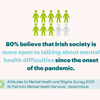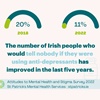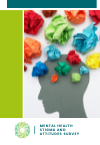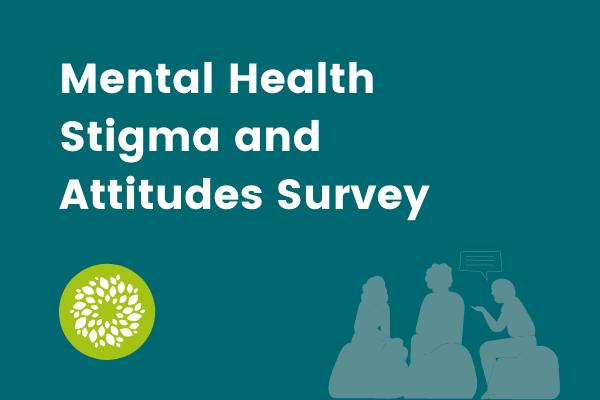
St Patrick’s Mental Health Services (SPMHS) calls for a renewed focus on acceptance and understanding of mental health difficulties following our 2022 stigma survey results.
Findings from our annual Attitudes to Mental Health and Stigma Survey show that there have been significant improvements over the last five years, but increased education and understanding around mental health is still required to tackle the stigma that is ongoing in some areas.
The findings also reveal that, in many cases, people were more accepting of theirs and others’ mental health difficulties at the height of the pandemic. There are now some signs that these positive attitudes are regressing since 2020.
In response to the findings, we are calling on us all to renew our focus on challenging preconceptions about mental health and to move on from stigma and discrimination with the same determination and focus as was seen during the pandemic.
Mental health stigma has a direct impact on people’s willingness to seek help, which is often the first step towards recovery, so it is vital that tackling stigma is at the fore as we move into the future.
Pandemic's positive impact on talking about mental health
The annual survey, which is conducted each year by Amarách Research on behalf of SPMHS, has been tracking Irish society’s attitudes towards mental health for a number of years. The results from the 2022 survey show that the COVID-19 pandemic positively impacted people’s openness to talk about mental health.
are more comfortable talking openly about their mental health now than they were before the pandemic.
believe Irish society is more open to talking about mental health difficulties since the pandemic.
had also introduced new ways to manage their wellbeing since the pandemic.
Findings from the last five years of survey data* reveal that there was less stigma associated with experiencing mental health difficulties in 2020.
- In 2020, 8% of people would not tell anyone if they were experiencing a mental health difficulty during 2020, compared to 17% who would not tell anyone just two years earlier in 2018. The number of people less willing to disclose mental health difficulties since the pandemic has slightly risen since 2020, now at 11%.
- Only 13% of people surveyed in 2020 would tell no one if they felt they had an issue with alcohol, drugs or prescription medicines. This represents a 50% improvement in people’s willingness to disclose substance abuse issues in comparison to 2018, when 26% would tell no one. While still improved on 2018 levels, the number of people who would tell no one if they had an issue with substance abuse increased again in 2022 to 17%.
- In 2020, 8% of people would not have told anyone if their son or daughter was being treated for depression, compared to 18% in 2018. In 2022, the figure stood at 13%.
- 64% of people in 2020 would have been okay explaining to their boss that they needed time off work for a mental health difficulty, the highest percentage to date. This figure was 61% in 2018 and stands at 56% in 2022.
- 81% of people surveyed in 2020 said that they would tell someone if they were experiencing suicidal thoughts; while this fell to 77% in 2022, it still remains higher than 2018 levels (72%).
Improvements in disclosures and seeking help
A comparative review of results from the last five years also shows a steady improvement in people’s willingness to disclose mental health difficulties or suicidal thoughts to friends, family and colleagues. Improvements in people’s willingness to seek help for a mental health difficulty is emerging too.
- 18% of those surveyed in 2022 would tell no one if they had previously been treated as an inpatient for a mental health difficulty; in 2018, this figure stood higher at 27%.
- 66% of respondents in 2022 believed that someone who experiences panic attacks could work as head of a large company, while only 59% of respondents in 2018 believed this.
- The number of people who have had a colleague disclose a mental health difficulty to them has almost doubled since 2019; just 14% of people in 2019 had a colleague disclose a mental health difficulty to them, with this figure steadily rising every year to reach 26% in 2022[1].
- Only 6% of people surveyed in 2022 would consider it a sign of weakness if a friend, colleague or family member sought help for a mental health difficulty; in 2019, this figure was 5% higher at 11%.[2]
Survey findings also reveal that more people are now seeking support for their mental health, which may indicate that stigma is not as much of a barrier as it may have previously been. The number of people who have been treated for a mental health difficulty over the last five years has risen from 26% in 2018 to 39% in 2022. There has also been an increase in the number of parents seeking mental health supports for their children, with 17% seeking help in 2019 compared to 24% in 2022.
High levels of anxiety
Findings from the 2022 survey also demonstrate that people believe there are high levels of anxiety in Irish society, and that mental health stigma is still engrained in certain areas:
of people believe that there is a worrying prevalence of anxiety in Irish society
of people are afraid of experiencing mental health difficulties in the future
believe being treated for a mental health difficulty is seen as a sign of personal failure
- 22% don’t believe Irish people would willingly accept someone with a mental health difficulty as a close friend
- 49% don’t believe Irish people would treat someone with a mental health difficulty the same as anyone else
- 22% would consider it a sign of weakness if they sought help for a mental health difficulty themselves, whereas only 6% would consider it a sign of weakness if a friend sought help for a mental health difficulty.
Progress needed to end mental health stigma
Speaking about the trends emerging over the last five years, our Chief Executive Officer, Paul Gilligan, said: “There is no doubt that, in many cases, we are seeing improvements in Irish society’s attitudes towards mental health, but the findings show there’s still a lot of progress required to eradicate mental health stigma. Despite the significant challenges it presented, the COVID-19 pandemic was a catalyst for positive change in attitudes towards mental health, with findings showing that more people are open to talking about their mental health difficulties than they were pre-pandemic, and more people having introduced positive practices to manage their wellbeing."
"While the pandemic may be in the rear-view mirror for many, we must not lose the momentum generated, and we must continue to prioritise our mental health; to challenge stigma and discrimination; and to implement positive mental health practices.”
He added: “While some of the findings still indicate high levels of stigma, the results can be used to focus our attention on the areas of mental health that require further education and better awareness. Self-stigma is a challenge, and we know that by reducing stigma we can positively impact people’s openness to seek support when required. A reduction in stigma enables more people to feel empowered to reach out at an appropriate time in their mental health journey, which is the first step towards recovery."
"Through a continued focus on educating people about mental health difficulties, their own mental health and wellness, and the barriers that stigma can unnecessarily create for those experiencing mental health challenges, we can work towards a fully inclusive society where everyone is empowered to live a mentally healthy life.”
See the full survey results
Media queries
Please get in touch with our Communications team for any press or media queries on our 2022 stigma survey.
Notes
The Annual Attitudes to Mental Health and Stigma Survey is a bespoke online survey conducted to explore the public’s awareness of, and attitudes towards, mental health in Ireland.
*Each year, the questionnaire is designed based on previously used iterations of the survey to allow for year-on-year comparisons. From 2020 onwards, questions related to the mental health impact of COVID-19 were added. A nationally representative sample of over 500 adults aged 18+ is surveyed each year, with quotas set on gender, age, region and social class. Over the past five years, 3,444 members of the public have been surveyed, and the average margin of error was 3.9%. Only changes greater than 3.9% can be read to indicate change. Fieldwork for the annual survey takes place between May and July 2022 for a roughly one-week period.
[1] 2019 was the first year that respondents were asked if they had had a colleague disclose a mental health difficulty to them
[2] 2019 was the first year respondents were asked if they would consider it a sign of weakness if a friend, colleague or family member sought help for a mental health difficulty.

